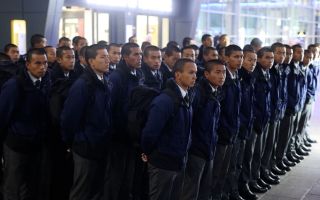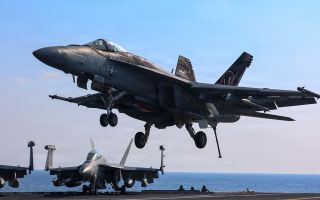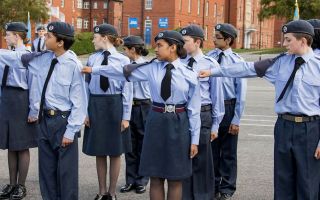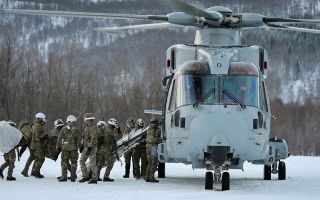Sitrep: Government making sensible cuts as Defence needs to do fewer things, but better
The recent cuts announced by the Defence Secretary are mostly "sensible" that show this Government means what it says, according to defence expert Professor Michael Clarke.
John Healey has decided to cut 14 Chinooks, 17 Pumas, 46 Watchkeeper drones, one frigate, two RFA tankers and both the Royal Navy's landing platform dock ships.
But Prof Clarke said the cuts outlined the fact that it is "not worth carrying on keeping these things alive on paper".
He was speaking on the latest episode of the Sitrep podcast - which analyses the top defence stories of the week and is available wherever you get your podcasts.
- Sitrep: Ukraine and Nato support, deterring China and peace in the Middle East
- Sitrep: Ex-general worried Trump will sack senior officers who go against him
- Sitrep: Giving CDS new powers over all three services great in principle, but hard to execute
He said it was the Labour Government saying "let's be brave".
"'Let's cut them now so that we can get on with the new capabilities that we really need'," he said.
"All governments say that, most governments don't really mean it, this government looks so far as if they mean it.
"This Labor government is determined to do defence differently.
"How differently, we’ll see when the [Strategic] Defence Review comes out, but… this is clearing the ground."
Prof Clarke believes this round of cuts is just the start, with the UK set to see more capabilities being cut once the SDR is published.
"The new Defence Review, I think, will say that we've got to do fewer things better and more credibly," he said.
Regarding the specific capabilities axed recently, Prof Clarke said "most of them are sensible".
He outlined that the cutting of the LPDs, namely HMS Albion and HMS Bulwark, would mean the UK could no longer carry out an amphibious assault in any meaningful way.
But he denied this was "a black day for the Royal Marines" - as it was described by Conservative MP Julian Lewis, who chaired the Defence Committee.
"We'd love to have them, but the fact is defence [has] got to be prioritised much more sharply than it has been in the past," he said.
"And I have to say, previous Conservative governments, because they hate to be seen as weak on defence, were keeping Albion and Bulwark alive for the sake of avoiding a political row.
"But they were only keeping them alive on paper, not as real ships that could do something useful.
"One of those ships, Bulwark, hasn't been in the water for seven years, and Albion has been out for one year."
Regarding the Chinooks, Prof Clarke said the UK could survive for two years with a slightly depleted fleet.
With new Chinooks set to arrive in two years' time, he said it was a "reasonable management of the fleet decision to take".
He also said the cutting of the Pumas makes sense as they are only used in Cyprus and Brunei for roles, as Defence Secretary John Healey pointed out, can be done by civilian helicopters.
The axing of HMS Northumberland was compared by Prof Clarke to having a car written off.
"It's a bit like, your car gets hit and it turns out to be a write-off for a relatively small amount of damage because the cost of actually doing the repairs," he said.
"We will miss Northumberland, but I mean we haven't had Northumberland for some years and we weren't going to have it until 2027."
Prof Clarke said the axing of the Army's old Watchkeeper drones was putting the capability "out of its misery".
"Drone technology is advancing very quickly, so the Watchkeepers are pretty obsolete now," he said.
"But also it's been a troubled programme. Watchkeeper has never been a particularly happy technology for various reasons."
The axing of the two RFA ships is coupled with the fact the Royal Navy is in a "dry dock refitting problem".
"When our carrier goes out it needs somebody else's, ie another country, to support it, which is fine within the Nato alliance, but it shows how threadbare the sustainability issues are, or the Navy is now in terms of sustainability," he said.








